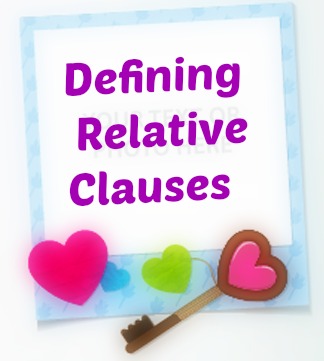PUBLICIDADE
We know that Relative Clauses are responsible for give extra information to a sentence by defining a noun, its define something about someone or somewhat we are talking about in the sentence. In English they receive the name of defining relative clauses. / Sabemos que as orações relativas são responsáveis pelas informações extras dadas às orações delimitando um substantivo e definem algo sobre alguém ou sobre alguma coisa citada. Em inglês, elas recebem o nome de orações restitivas.
Let's talk about Defining Relative Clauses / Vamos falar sobre Orações Restitivas:
Look at the example: / Veja o exemplo:
The man who works next block lives in Manhattan.
O homem que trabalha no próximo quarteirão mora em Manhattan.
“who works next block” is a defining relative clause, because it tells us which man we are talking about. / “who works next block” é uma oração restritiva porque nos diz de qual homem estamos falando.
Let's look some more examples: / Vejamos alguns outros exemplos:
→ Be careful! There's the man that ran towards my sister last week.
Cuidado! Ali está o homem que correu atrás da minha irmã semana passada.
→ The film that we watched last month was beautiful.
O filme a que nós assistimos mês passado foi bonito.
→ This is the dress I saw her wearing last night.
Este é o vestido que eu a vi usando noite passada.
The defining relative clauses are related with some information about something o someone, so, they tell us which cat, which dog, which film, which play, which dress, which person, man or woman we are talking about. / As orações restritivas estão relacionadas com alguma informação sobre algo ou alguém, por isso, elas nos dizem de qual gato, cachorro, filme, peça, vestido, pessoa, homem ou mulher estamos falando.
To make the defining relative clauses we most use the relative pronouns, such as, who and that to talk about people and which and that to talk about things. Like in the examples below: / Para formar a oração restritiva, você deve usar os pronomes relativos, como “who” e “that”, para falar de pessoas, e “which” e “that”, para falar sobre coisas.
→ He is the man who rides my bike.
Ele é o homem que anda em minha bicicleta.
→ She is the woman that drives me home.
Ela é a mulher que me traz pra casa.
→ This is the house that I love most.
Esta é a casa que eu mais amo.
→ This is the place which we was yesterday.
Este é o lugar que nós estávamos ontem.
As the examples showed us we use the pronouns in two situations: for people and thing. Remember that we have to considerate their functions. Look at the chart: / Como os exemplos nos mostraram, usamos os pronomes em duas situações: para pessoas e coisas. Lembre-se de que temos que considerar as funções dos pronomes. Veja a tabela:

We can simplifying or reduce the relative clauses in some cases. There are several ways to do it. Let's check: / Podemos simplificar ou reduzir as orações restritivas em alguns casos. Existem alguns meios para fazer isso. Vamos conferir:
a) We can omitted the pronoun when it's the object of the verb. / Podemos omitir o pronome quando ele é o objeto do verbo.
We can say: / Podemos dizer:
This is the book that I bought in the bookstore.
Este é o livro que eu comprei na livraria.
This is the book which I bought in the bookstore.
Este é o livro que eu comprei na livraria.
This is the book I bought in the bookstore.
Este é o livro comprei na livraria. (Não usamos a mesma estrutura em português)
Look that in this sentence “book” is the object of the verb, in this case, the verb buy. / Veja que nessa oração “livro” é o objeto do verbo, que, nesse caso, é 'comprar'.
“I” is the subject. / “Eu” é o sujeito do verbo.
So, we can omitted the relative pronoun because it's the object, but when the relative pronoun is the subject it can't be omitted. Look, we can use it with different pronouns, but not without it. / Nós podemos omitir o pronome relativo, porque ele é o objeto; mas quando o pronome relativo é o sujeito, ele não pode ser omitido. Veja que podemos formar a oração com pronomes diferentes, mas não podemos fazer sem ele.
✓ This is the cat that appears from nowhere. / Este é o gato que apareceu do nada.
✓ This is the cat which appears from nowhere. / Este é o gato que apareceu do nada.
✗ This is the cat appears from nowhere. Este é o gato que apareceu do nada.
b) We can omitted the pronoun when the relative clause contains the verb “be” plus: an adjective phrase, a prepositional phrase, a past participle and a present participle: / Podemos omitir o pronome quando a oração restritiva apresentar o verbo “be” (ser/estar) + uma frase adjetiva, uma frase prepositiva, passado do particípio e presente do particípio.
→ Relative Clause with the verb 'be' + an adjective phrase: / Orações Restitivas com o verbo 'be' + uma frase adjetiva:
The girl who is interested in your laptop will telephone later.
A garota que está interessada em seu notebook irá telefonar mais tarde.
The girl interested in your laptop will telephone later.
A garota interessada em seu notebook irá telefonar mais tarde.
→ Relative Clause with the verb 'be' + a prepositional phrase: / Orações Restitivas com o verbo 'be' + uma frase prepositiva:
The DVD which is on the coffee table have been watched.
O DVD que está na mesa de centro já foi assistido.
The DVD on the coffee table have been watched.
O DVD na mesa de centro já foi assistido.
→ Relative Clause with the verb 'be' + a past participle: / Orações Restitivas com o verbo 'be' + passado do particípio:
The person who has been forgotten once stay worried the next time.
A pessoa que foi esquecida uma vez fica preocupada da próxima vez.
The person forgotten once is worried the next time.
A pessoa esquecida uma vez fica preocupada da próxima vez.
→ Relative Clause with the verb 'be' + a present participle: / Orações Restitivas com o verbo 'be' + presente do particípio:
The actors who are playing in the theater are very polite.
Os atores que estão fazendo a peça teatral são muito educados.
The actors playing in the theater are very polite.
Os atores fazendo a peça teatral são muito educados.
Por Janaína Mourão
Graduada em Letras - Inglês






